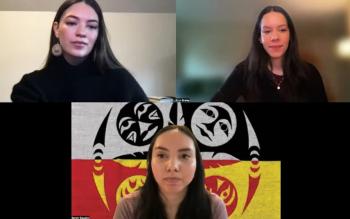Image Caption
Summary
Local Journalism Initiative Reporter
Windspeaker.com
In a candid discussion hosted by University of British Columbia’s Centre for Excellence in Indigenous Health, Indigenous public health advocates Eryn Braley and Jorden Hendry reveal their approaches to tackling systemic colonialism and racism within the healthcare system in the effort towards creating a more equitable healthcare landscape.
In a webinar for the UBC Learning Circle series, they share experiences from navigating everyday barriers to promoting community-driven solutions.
Braley is a member of the Saddle Lake Cree Nation in Alberta. She works for B.C.’s Provincial Health Services Authority as a program manager in the Indigenous Health Team. Hendry is a member of the Lax Kw’alaams Band, and is a Ph.D student at UBC. She works as a research assistant for the Office of the Provincial Health Officer.
The webinar challenges mainstream narratives that frame Indigenous identity as a risk factor for poor health, instead placing the focus on colonization as the root cause of systemic inequities.
"Indigeneity is something that actually provides wellness to us. It's a wellness factor. Being Indigenous is a source of strength and it's our culture that keeps us healthy,” Hendry said.
Offering a critical examination of public health narratives and practices, Braley and Hendry are advocating for a decolonial approach that centers Indigenous perspectives and rights.
"Being subject to Canadian colonial practices and policies is bad for Indigenous people's health. It violates their right to health, wellness, and discrimination-free living,” said Braley.
Colonial scripts
The webinar explores the perpetuation of colonial scripts and the need to dismantle systems of inequality.
"Colonial scripts include deficit framing, viewing Indigenous people as always struggling and needing help resulting in this saviour complex, believing that settlers know what's best,” said Hendry.
“In public health, specifically epidemiology, it really perpetuates the colonial script through the negative statistics that we see, especially when the negative statistics don't speak to colonization being the root cause of these stats we're seeing, and thus serving to further the colonial agenda,” Braley said.
Hendry and Braley emphasize the need to address the systemic issues rooted in colonialism and white supremacy within the healthcare system and society at large. The webinar highlights the importance of recognizing and challenging ingrained beliefs and structures.
Hendry explains the intentional creation of systems of oppression.
"These intentionally cultivated beliefs and stereotypes create internal prejudice that then gets acted upon, leads to discrimination, lowers access to healthcare, affecting health outcomes in an ongoing cycle."
What does dismantling systems of inequality mean?
"So the best way I have seen this explained is through Dr. Stephanie Nixon's coin model of privilege,” said Hendry.
According to a question and answer paper written by Nixon and Meron Gidey, “The coin model uses an intersectional approach to describe how multiple coins intersect and interact to create complex arrangements of advantage and disadvantage, which result in inequities.
“The goal is not to move people from the bottom of the coin to the top because both positions are unfair. The goal is actually to dismantle the system, dismantle the coin causing these inequities."
Hendry and Braley say this is required to achieve equity and justice for Indigenous peoples and marginalized communities.
The two women say it’s important that both Indigenous and non-Indigenous people on a team recognize their roles in lifting each other up and walking alongside each other.
More Indigenous representation in academia and research requires creating systems to question the leadership of non-Indigenous individuals in Indigenous-focused work and providing opportunities and funding for Indigenous students to pursue research within their own communities.
Tools like the "unlearning club" and training in anti-racism and cultural safety can help leaders understand their own positionality and perpetuation of racism, said Hendry.
This unlearning can be difficult for older leaders, or those with deeply ingrained beliefs, acknowledge Braley and Hendry.
“You can't change the minds of those who don't want their minds changed. I think you can provide the information as many times as you want, but it's going to be up to them
to pick up those teachings, and sometimes that requires them to hear the message 10 times, 20 times maybe,” says Hendry.
Braley agrees. “That's one of the main barriers,” she said. “There are people who are in decision-making or have that decision-making power who don't have that enabling leadership, who are quite resistant to the work.
“And so I think part of it is planning for when resistance will show up, right? We know that resistance is going to show up. It's inevitable.”
Planning on how to address it can avoid the work being stalled, Braley said.
To meet the challenge of convincing resistant leaders can start with creating cohorts of people within organizations who are committed to this work and fostering enabling leadership, they say.
Accountability tools, such as mandates from government declarations to follow through on, can push change.
Emphasizing the importance of individuals sharing, promoting, and engaging with the works of Indigenous authors, they stress the role that each person can play a role in disseminating Indigenous knowledge and increasing its reach within mainstream society.
By the end of the webinar, Braley and Hendry share not only a call to action but also a roadmap for transforming public health paradigms, fostering inclusivity, and advancing health equity for Indigenous peoples and marginalized communities through collaboration, education, systemic change, and community involvement.
Local Journalism Initiative Reporters are supported by a financial contribution made by the Government of Canada.

